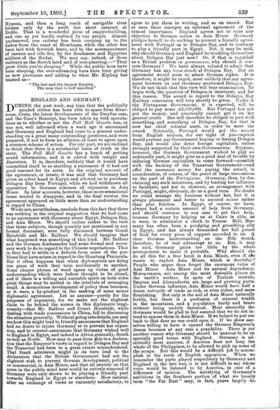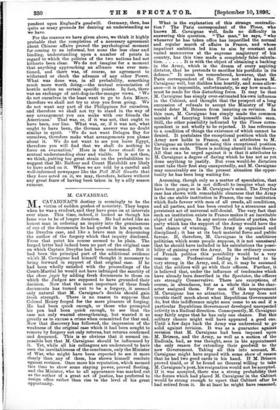ENGLAND AND GERMANY. D URING the past week, any time that
the politically minded citizen has been able to spare from Khar- toum, Crete, the latest developments of the Dreyfus case, and the Czar's Rescript, has been taken up with specula- tions as to whether or not the Pall Mall Gazette was, or was not, well informed when a week ago it announced that Germany and England had come to a general under- standing on a great many outstanding 'questions, and, were prepared, if not to form an alliance, at least to agree upon a common scheme of action. For our part, we are inclined to think that there is a substantial basis of truth in the story. The Pall Mall Gazette has a knack of getting sound information, and it is edited with insight and discretion. It is, therefore, unlikely that it would have committed itself to so startling a statement if it had not good warrant for its news. In the original account of the agreement, or treaty, it was said that Germany had given us a free hand in Egypt, and allowed us to purchase Delagoa Bay from Portugal, while we had withdrawn all opposition to German schemes of expansion in Asia Minor. In later accounts, however, these more sensational items tended to disappear, and in the final version the agreement appeared as little more than an understanding in regard to China We do not,nevertheless, conclude from this fact that there was nothing in the original suggestion that we had come to an agreement with Germany about Egypt, Delagoa Bay, and Asia Minor. We should incline rather to the view that these subjects, though possibly not mentioned in any formal document, were fully discussed between Count Hatzfeldt and Mr. Balfour. We should imagine that what happened was something of this kind. Mr. Balfour and the German Ambassador had some formal and neces- sary work to do in regard to the Chinese negotiations. That is, they had to settle in a definite form some of the pro- blems that have arisen in regard to the Shantung Peninsula. But it often happens that when diplomatists are doing one piece of work they turn accidentally to another. Some chance phrase or word opens up vistas of good understanding which were before thought to be closed, and if there is a willing and amicable spirit on both sides great things may be settled in the intervals of arranging small. A momentous development of policy thus becomes, as it were, a by-product in the making of some minor diplomatic agreement. Let us assume—purely for the purposes of argument, for we make not the slightest claim to be behind the scenes in this diplomatic tragi- comedy—that Mr. Balfour and Count Hatzfeldt, while dealing with trade concessions in China, fell to discussing the situation generally. Without going intodetails, one may see how this might lead to friendly assurances that England had no desire to injure Germany or to prevent her expan- sion, and to counter-assurances that Germany wished well to England in Egypt, and indeed in Africa generally, South as well as North. How easy to pass from this to a declara- tion that the Emperor's views in regard to Delagoa Bay and the Transvaal had been to a great extent misunderstood. That frank admission might in its turn lead to the declaration that the British Government had not the slightest wish to prevent German development, political or commercial, in Asia Minor, and that all anxiety on that score in the public mind here would be entirely removed if Germany were only shown to be playing a friendly part towards England in Egypt or elsewhere. How natural, after an exchange of views so eminently satisfactory, to agree to put them in writing, and so on record. But at once there emerges an informal agreement of the utmost importance. England agrees not to raise any objection to German action in Asia Minor. Germany pledges herself to do nothing to prevent a friendly agree- ment with Portugal as to Delagoa Bay, and to continue to play a friendly part in Egypt. But, it may be said, why should Germany and England be troubling themselves about Delagoa Bay just now? Or, if that is regarded as a British problem en permanence, why should it con- cern Germany ? We have always refused to admit that Germany has any locus standi at Delagoa Bay. But an agreement would seem to admit German rights. It is therefore, it might be urged, most unlikely that any agree- ment between us and Germany mentioned Delagoa Bay. We do not think that this view will bear examination. To begin with, the question of Delagoa is imminent, and for this reason. The award in regard to the Delagoa Bay Railway concession will very shortly be given. Under it the Portuguese Government, it is expected, will be obliged to pay some .R2,500,000. But Portugal has not got the money, and practically cannot get it on her general credit. She will therefore be obliged to part with something, and something at Delagoa Bay, for that is now her chief colonial asset, in order to meet the award. Naturally, Portugal would get the money from English sources, for our right of pre-emption would prevent any Government buying or leasing Delagoa. Bay, and would also deter foreign capitalists, unless strongly supported by their own Governments. Suppose, however, the German Government wished to play an unfriendly part, it might give us a good deal of trouble by inducing German capitalists to come forward—possibly with the backing of the Transvaal Government—and offer the necessary money for paying the award, in consideration, of course, of the grant of large concessions on the part of the Portuguese. Germany, then, by dis- claiming any such intentions, and by lending her influence to facilitate, and not to obstruct, an arrangement with Portugal, might, obviously, do us a good turn. No doubt we could manage the business without her, but it is always pleasanter and better to succeed minus rather than plus friction. In Egypt, of course, we have, always had a certain amount of help from Germany, and should continue in any case to get that help, because Germany by helping us at Cairo is able, as it were, to administer a check to France. Still, Ger- many has often been a grudging and grumbling ally in Egypt, and. has always demanded her full pound of flesh for every piece of support accorded to us. A clear German understanding on the Nile would, therefore, be of real advantage to us. But, it may be said, Germany gains too little by the whole arrangement to make it probable. Why should she do all this for a free hand in Asia Minor, even if die wants to exploit Asia Minor, which is doubtful ? People who argue thus forget the enormous value of Asia Minor. Asia Minor and its natural dependency, Mesopotamia, are among the most desirable places on the earth's surface. In spite of Turkish misrule, Smyrna and Alexandretta are large and growing ports. Under German influence, Asia Minor would have half a dozen entrep4ts of trade as rich, or even richer, and more flourishing. Not only is the soil of Asia Minor naturally fertile, but there is a profusion of mineral wealth in the mountains, and a population hardy and brave without being unduly fanatical. Most assuredly the Germans would be glad to feel assured that we do not in- tend to oppose them in Asia Minor. If we helped to put our back to that door no one could open it. If we show our- selves willing to have it opened the German Emperor's dream becomes at any rate a possibility. There is yet another reason why Germany should be anxious to be on specially good terms with England. Germany is ad- mittedly most anxious, if America does not keep the whole of the Philippines, to be allowed to pick up some of the scraps. But this would be a difficult job to accom- plish in the teeth of English opposition. When we remember the parts played respectively by Germany and England in the late war, it is not difficult to say whose voice would be listened to by America, in case of a difference of opinion. The satisfying of Germany's ambitions in the Southern portion of what we loosely term "the Far East" may, in fact, Fctve largely de- pendent upon England's goodwill. Germany, then, has quite as many grounds for desiring an understanding as we have.
For the reasons we have given above, we think it highly probable that the completion of a necessary agreement about Chinese affairs proved the psychological moment for coming to an informal, but none the less clear and binding, understanding upon a number of points in regard to which the policies of the two nations had not hitherto been clear. We do not imagine for a moment that anything approaching an alliance was ever men- tioned, and there was, of course, no agreement to withstand or check the advance of any other Power. What was done was, in all probability, something much more worth doing,—the mutual renunciation of hostile action on certain specific points. In fact, there was an exchange of anti-dog-in-the-manger views. 'We do not ourselves in the least want to go to Asia Minor, therefore we shall not try to stop you from going. We do not want any part of the Philippines for ourselves, and therefore we shall not try to stand in the way of any arrangement you can make with our friends the Americans.' That was, or, if it was not, that ought to have been, our line. What was, or, if it was not, what ought to have been, the German answer was no doubt similar in spirit. We do not want Delagoa Bay for ourselves, therefore make what arrangements you please about it. We do not want to see you leave Egypt, therefore you will find that we shall do nothing to force on evacuation.' Here is the locus standi for a, mutual understanding clear and visible. It is not then, we think, putting too great strain on the probabilities to suggest that Mr. Balfour and Count Hatzfeldt are likely to have acted on it. When we are told by a careful and well-informed newspaper like the Pall Mall Gazette that they have acted on it, we may, therefore, believe without any great fears of having been taken in by a silly season rumour.



































 Previous page
Previous page